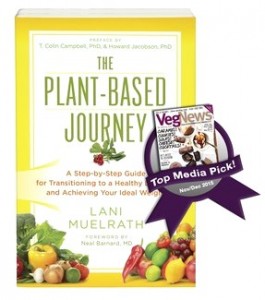This webinar was presented as part of Activist Appreciation Month hosted by In Defense of Animals (IDA).
The program host is Lisa Levinson, Director of The Sustainable Activism Campaign for IDA.
In the words of Lisa Levinson,
In this Activist Appreciation Month webinar, learn how to cut through stress, reduce reactivity, build resilience, and restore equanimity with mindfulness instructor and The Mindful Vegan: A 30-Day Plan for Finding Health, Balance, Peace, and Happiness author Lani Muelrath.
Titled “Mindfulness for the Veg-Minded, Advocates and Activists: How to Cut Through Stress, Reduce Reactivity, Build Resilience, and Restore Equanimity with The Mindful Vegan author Lani Muelrath”, the first two to three minutes of this presentation of introduction of yours truly have been trimmed to get right down to business with the presentation; you can move forward right to the presentation which starts at about one minute in. The full recording, including my introduction, can be found at the In Defense of Animals replay here.
How Can We Make Activist More Sustainable?
Activism, advocacy, and standing up for not only human but non-human animals generates its own reservoir of stress. Repeated exposure to the objectification and poor treatment – if not abuse of – animals creates what is known as compassion fatigue, now more commonly known as secondary traumatic stress (STS).
The result can be excessive rumination, a consuming urge to make things right, and a mounting experience of anxiety. These discomforts and disquieting states bring with them a cascade of reactivity that creates even more dismay The result is not only increased stress and sadness in our lives, but also diminished resiliency critical to the sustainability of activism and advocacy.
How Mindfulness Enhances Activist Sustainability
This reactivity rules much of our days. This then shows up in our lives in a variety of ways: stress eating, irritability, zoning out online, obsessing over one thing or another—no doubt at least one of these reactions to stress is familiar to each of us. And living vegan or vegetarian in an omnivorous world has its own set of challenges. These range from tension as relationships shift to compassion fatigue.
Mindfulness is a specific form of mental training and a particular kind of awareness you bring to your daily activities. Together, these practices lead to reductions in reactivity and the cultivation of positive brain states. With the simple tools of mindfulness, you can learn to cultivate resilience and more easily navigate difficult conversations, upsetting situations, and emotional stress.

Getting started with mindfulness training—a practical, non-sectarian, science-based practice for decreasing reactivity—begins with four straightforward steps. In this presentation – along with some of the brain research and real-life examples of the positive effects of mindfulness practice on our living experience – Lani shares these steps, research about the benefits of mindfulness training, and specific tools for practicing mindfulness for managing stress and creating a healthier lifestyle in our webinar.
Links to References
In this presentation, there are several references for which I provide links: my Open Letter to Oprah, and The 60 Minutes with Anderson Cooper segment on Mindfulness Meditation, and more about The Mindful Vegan: A 30-Day Plan for Finding Health, Balance, Peace, and Happiness. In addition, several more video presentations about the power of mindfulness practices here.





Lani,
This is great! To have your message in webinar form brings a whole new dimension. I didn’t know about In Defense of Animals and am not only glad to find out about their work, but that they are asking you for your support in this very important way. Good for them! And for us, too, because we now have this.
Thanks for posting, this, and thanks to In Defense, too.
Cyndy
Hi Cyndy! Thank you so much, I am glad that you enjoyed this webinar and am grateful to In Defense of Animals for the opportunity! They have done splendid, enormous work for all, including the non-human animals over the years and I am honored to be part of their programming.
I appreciate you sharing your thoughts!
Lani
Hi Lani, do you have the replay of the interview that ms Freitag conducted with you on your website? I so wanted to hear that. Thanks, karin
Karin, I know that replays are available to those who purchase the post-event package. I am not sure if the recording will also be released to me. I’ll check!
thanks,
Lani
Karin, to follow up on this, I just learned that I will be givne access soon and will post it on my blog as an article when available. Are you getting my newsletter? This way you will receive announcement right away.
thanks!
Lani
Thanks very practical. Will certainly share website with my good friends.